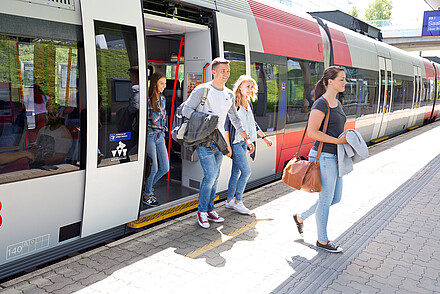Renewable energy, less paper printing, plastic avoidance... A number of measures have already been taken in the area of infrastructural issues and sustainability in university operations.
Current examples
Electricity for university operations from our own photovoltaic systems


Photovoltaic (PV) systems are installed on the roofs of both the Urstein and Kuchl campuses. Currently, around 15% of the total annual electricity requirement is generated by the PV systems.
The SUAS obtains 100% of its electricity from renewable hydropower (in accordance with the electricity supply contract with Salzburg AG)
Details on the PV systems
Urstein Campus
- Installed output 100 kWp
- Annual yield on average approx. 100 MWh pa = 70 t CO² savings pa
- Public e-charging station for cars since 2018 with 2x11 KW charging points
Kuchl Campus
- Installed output 93 kWp
- Annual yield on average 90 MWh pa = 65 t CO² savings pa
- Public e-charging station for cars since 2022 with 2x11 KW charging stations
Promotion of public mobility

As an environmentally conscious employer, the FH Salzburg supports the travel of its employees by public transport with an annual contribution that is tax-free for employees. Employees of the FH Salzburg receive the Salzburg Climate Ticket of the Salzburg Transport Association at a reduced price. The Climate Ticket Austria is also financially supported.
Students have access to a discounted semester ticket via the transport association.
In principle, all locations of the FH Salzburg are easily accessible by public transport. In addition, there are (covered) bicycle racks at the locations.
Actions to reduce energy consumption
In October 2022, FH Salzburg launched a campaign to identify further savings potential for overall energy consumption and to reduce it through further measures.
What has already been done?
Thanks to various measures, energy consumption has been kept constant over the past 10 years. Measures have been and continue to be taken to increase energy efficiency, such as the conversion of the computer centre, the replacement of indoor and outdoor lighting with LEDs, the expansion of the in-house photovoltaic systems and the ongoing optimisation of the building's technical systems. The Salzburg University of Applied Sciences obtains electricity from 100% renewable hydropower and is largely heated with renewable district heating. Further energy optimisation of individual lecture halls is being increased through modernisation and technical retrofitting. In the area of mobility, too, the FH supports the lowest possible emission travel to the workplace by promoting public transport.
What are we currently doing?
The following measures have been taken to exploit further savings potential: The automatic switch-off times of the teaching room and car park lighting have been brought forward to 9:15 pm. Standby operation of printers and copiers has been reduced. The room temperature at the Kuchl and Urstein campuses was generally set to 20 degrees.
How can the individual contribute personally?
- Do not leave laptops/PCs/monitors in standby mode, but switch them off.
- Always turn off lights and projectors after class and close windows.
- Switch off lab equipment (where possible) after use and make sure it runs efficiently
- Ventilate the offices and classrooms instead of closing them.
- Travel by public transport (job ticket for staff, semester ticket for students)
- Print less
- Walk instead of using the lift
Do you have further ideas?
We look forward to receiving your suggestions at building@fh-salzburg.ac.at and nachhaltigkeit@fh-salzburg.ac.at.
